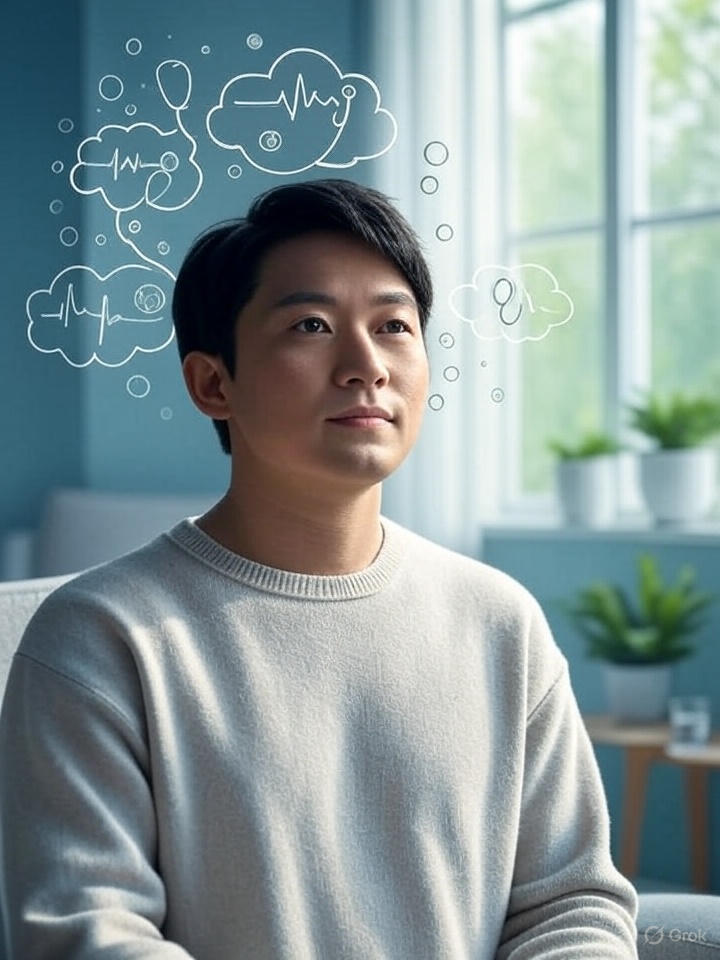Health anxiety, also known as hypochondria or illness anxiety disorder, affects millions of people worldwide, creating a cycle of persistent worry about having or developing serious medical conditions. This comprehensive guide explores everything you need to know about health anxiety, from its symptoms and causes to effective treatment strategies and coping mechanisms.
What is Health Anxiety?

Definition & Terminology
Health anxiety is a mental health condition characterized by excessive worry about having or developing a serious illness, despite having no or only mild symptoms. Previously known as hypochondria, the medical community now uses more precise terms including illness anxiety disorder and somatic symptom disorder, depending on the specific presentation.
According to the American Psychiatric Association, illness anxiety disorder involves preoccupation with having or acquiring a serious illness, with somatic symptoms being absent or mild. This condition goes far beyond normal health concerns, creating significant distress and impairment in daily functioning.
Prevalence & Demographics
Research indicates that health anxiety affects approximately 4-5% of the population at any given time, with lifetime prevalence rates reaching up to 7.7%. The condition typically emerges in early adulthood, though it can develop at any age. Studies published in medical journals show that health anxiety affects men and women equally, contrary to earlier beliefs that it predominantly affected women.
Interestingly, health anxiety often correlates with higher levels of education and health literacy, as individuals with more medical knowledge may be more aware of potential symptoms and conditions. This phenomenon has contributed to the rise of cyberchondria – health anxiety fueled by internet searches about symptoms.
Health Anxiety vs Normal Worry
Everyone experiences health-related concerns occasionally. The key difference lies in the intensity, duration, and impact of these worries. Normal health concern is proportionate to actual symptoms and resolves with reassurance or medical consultation. Health anxiety, however, involves:
- Persistent worry despite medical reassurance
- Catastrophic thinking about minor symptoms
- Significant interference with daily activities
- Constant need for medical checking or avoidance of medical care
- Uncertainty intolerance that makes it difficult to accept that symptoms might be benign
Symptoms & Diagnosis of Health Anxiety
Physical Symptoms
While health anxiety is primarily a psychological condition, it manifests through very real physical symptoms. The mind-body connection means that anxiety can create or amplify bodily sensations, leading to:
Common Physical Manifestations:
- Headaches and tension
- Chest pain and heart palpitations
- Dizziness and lightheadedness
- Nausea and digestive issues
- Muscle tension and fatigue
- Shortness of breath
- Sleep disturbances
These symptoms result from the body’s stress response system, which activates when the brain perceives threat – even when that threat is imagined rather than real.
Emotional and Cognitive Symptoms
The psychological aspects of health anxiety involve complex thought patterns and emotional responses:
Cognitive Symptoms:
- Catastrophic thinking – immediately assuming the worst possible outcome
- Persistent intrusive thoughts about illness
- Difficulty concentrating on non-health related activities
- Catastrophic misinterpretations of normal bodily sensations
- Selective attention to potential symptoms
Emotional Symptoms:
- Persistent anxiety and worry
- Panic attacks related to health concerns
- Depression from constant fear
- Irritability and mood swings
- Feeling overwhelmed or helpless
Behavioral Patterns
Health anxiety drives specific behaviors that, while intended to reduce anxiety, often maintain and worsen the condition:
Reassurance-Seeking Behaviors:
- Frequent medical appointments
- Repeatedly asking family and friends for reassurance
- Seeking multiple medical opinions
- Excessive internet searching (cyberchondria)
Checking Behaviors:
- Constant body scanning for symptoms
- Frequent self-examination
- Obsessive monitoring of vital signs
- Photographing or measuring body parts
Avoidance Behaviors:
- Avoiding medical appointments or health information
- Staying away from activities that might trigger health fears
- Avoiding certain foods, environments, or situations
- Social withdrawal due to health fears
Differential Diagnosis
Healthcare professionals must distinguish health anxiety from other conditions with similar presentations:
Somatic Symptom Disorder: Unlike illness anxiety disorder, this involves significant physical symptoms that cause distress.
Generalized Anxiety Disorder (GAD): While GAD involves excessive worry, it’s not specifically focused on health concerns.
Obsessive-Compulsive Disorder (OCD): Some health anxiety presentations involve obsessive thoughts and compulsive checking behaviors similar to OCD.
Panic Disorder: Physical symptoms of panic attacks can be mistaken for serious medical conditions, leading to health anxiety.
Causes & Underlying Mechanisms
Cognitive Distortions & Anxiety Misinterpretation
Health anxiety often stems from cognitive distortions – systematic errors in thinking that lead to inaccurate interpretations of bodily sensations. Common distortions include:
All-or-Nothing Thinking: Viewing symptoms as either completely normal or catastrophically dangerous, with no middle ground.
Probability Overestimation: Overestimating the likelihood of having a serious condition while underestimating the probability of benign explanations.
Confirmation Bias: Selectively focusing on information that confirms health fears while ignoring contradictory evidence.
The anxiety-driven symptom misinterpretation cycle works as follows: normal bodily sensations trigger anxious thoughts, which activate the body’s stress response, creating more physical symptoms, which are then interpreted as evidence of illness, perpetuating the cycle.
Somatosensory Amplification
Somatosensory amplification refers to the tendency to perceive normal bodily sensations as intense, noxious, and disturbing. Individuals with health anxiety often have heightened sensitivity to internal bodily signals, making them more likely to notice and worry about normal physiological processes.
Research published in the Journal of Psychosomatic Research demonstrates that this amplification can be both a predisposing factor and a consequence of health anxiety, creating a self-reinforcing pattern.
Cyberchondria & Self-Diagnosis Behaviors
The internet age has introduced cyberchondria – health anxiety specifically related to online health information seeking. While the internet provides valuable health resources, it can also fuel anxiety through:
- Symptom checkers that suggest serious conditions
- Medical websites that emphasize rare but serious diseases
- Forums where people share worst-case scenarios
- Easy access to medical information without proper context
Self-diagnosis health anxiety often begins with innocent symptom searches but can quickly escalate into obsessive research behaviors that increase rather than decrease anxiety.
Treatment & Management Strategies
Cognitive Behavioral Therapy (CBT) for Health Anxiety
CBT for health anxiety is considered the gold standard treatment, with extensive research supporting its effectiveness. CBT addresses the thoughts, feelings, and behaviors that maintain health anxiety through several key components:
Cognitive Restructuring:
- Identifying and challenging catastrophic thoughts
- Developing more balanced, realistic interpretations of symptoms
- Learning to tolerate uncertainty about health
- Practicing probability estimation exercises
Behavioral Interventions:
- Reducing checking and reassurance-seeking behaviors
- Gradually increasing activities that have been avoided
- Limiting internet searches about health
- Developing healthy coping strategies
Psychoeducation:
- Understanding the physiology of anxiety
- Learning about the mind-body connection
- Recognizing the role of attention in symptom perception
Studies show that CBT exercises for catastrophic thoughts can significantly reduce health anxiety symptoms, with improvements maintained long-term.
Exposure Response Prevention (ERP) for OCD-like Health Fears
For individuals whose health anxiety includes obsessive-compulsive features, Exposure Response Prevention (ERP) can be particularly effective. This approach involves:
- Gradually exposing oneself to health-related triggers
- Resisting the urge to perform checking or reassurance-seeking behaviors
- Learning that anxiety naturally decreases without performing compulsions
- Building tolerance for uncertainty and discomfort
Self-Help Techniques and Coping Strategies
Managing health anxiety without medication is possible through various self-help approaches:
Mindfulness and Acceptance:
- Mindfulness for health anxiety helps individuals observe thoughts and sensations without judgment
- Acceptance and Commitment Therapy (ACT) techniques focus on living meaningfully despite health concerns
- Body scan exercises to develop a healthier relationship with physical sensations
Practical Coping Strategies:
- Setting specific times for health-related concerns (worry time)
- Limiting internet searches about symptoms
- Developing a support network of understanding friends and family
- Engaging in regular physical exercise and stress-reduction activities
- Maintaining a symptom diary to identify patterns and triggers
Digital Wellness for Cyberchondria:
- Using website blockers during vulnerable times
- Seeking information only from reputable medical sources
- Setting time limits for health-related internet searches
- Asking trusted healthcare providers for recommended resources
Medical Liaison and Professional Support
Working effectively with healthcare providers is crucial for managing health anxiety:
Communicating with Your GP:
- Being honest about health anxiety concerns
- Discussing appropriate frequency of medical check-ups
- Establishing boundaries around reassurance-seeking
- Following through with recommended treatments
Professional support through the National Health Service (NHS) provides access to specialized mental health services. Additionally, resources like our health visitor toolkit for professionals offer valuable guidance for healthcare workers supporting individuals with health anxiety.
Related Concepts & Context
Health Anxiety in Children & Adolescents
Health anxiety in teens and children presents unique challenges and opportunities for intervention. Young people may develop health fears through:
- Observing anxious family members
- Experiencing or witnessing medical procedures
- Exposure to health-related media content
- Academic stress that manifests as physical symptoms
Teen health anxiety often involves:
- School avoidance due to physical symptoms
- Frequent visits to the school nurse
- Seeking parental reassurance about symptoms
- Social withdrawal due to health fears
Early intervention is crucial, as health anxiety in adolescence can persist into adulthood if left untreated. Family-based interventions that include psychoeducation for parents and siblings often prove most effective.
Comorbid Conditions
Health anxiety frequently co-occurs with other mental health conditions:
Depression: Chronic health anxiety can lead to depression, particularly when it significantly impacts quality of life and relationships.
Generalized Anxiety Disorder: Many individuals experience health anxiety alongside broader anxiety concerns.
Obsessive-Compulsive Disorder: The checking and reassurance-seeking behaviors in health anxiety can overlap with OCD symptoms.
Panic Disorder: Physical symptoms of panic attacks can trigger health anxiety, while health fears can precipitate panic attacks.
Understanding these connections helps healthcare providers develop comprehensive treatment plans that address all aspects of an individual’s mental health.
Risks of Over-Testing & Unnecessary Healthcare Use
Health anxiety can lead to problematic healthcare utilization patterns:
Medical Overuse:
- Frequent emergency room visits
- Excessive diagnostic testing
- Multiple specialist consultations
- Overuse of screening procedures
Consequences:
- Increased healthcare costs
- False positive results leading to further anxiety
- Medical complications from unnecessary procedures
- Strained relationships with healthcare providers
Research published in Forbes Health indicates that individuals with health anxiety use healthcare services 2-3 times more frequently than the general population, highlighting the importance of appropriate mental health intervention.
Interactive Assessment: Do You Have Health Anxiety?
Consider these questions to assess whether your health concerns might indicate health anxiety:
- Do you spend more than an hour per day worrying about your health?
- Do physical sensations immediately trigger fears of serious illness?
- Do you frequently search the internet for information about symptoms?
- Does medical reassurance provide only temporary relief from health fears?
- Have health concerns significantly impacted your work, relationships, or daily activities?
- Do you avoid activities, places, or information due to health fears?
- Do you frequently check your body for signs of illness?
- Do minor symptoms cause you significant distress?
If you answered “yes” to several of these questions, consider speaking with a healthcare provider about your concerns.
Frequently Asked Questions
When is Worry About Health “Too Much”?
Health worry becomes problematic when it:
- Persists despite medical reassurance
- Significantly interferes with daily functioning
- Causes distress disproportionate to actual symptoms
- Leads to excessive healthcare seeking or avoidance
- Dominates thoughts and conversations
The key indicator is impact: if health concerns are preventing you from living your life fully, it may be time to seek professional help.
Can Anxiety Cause Real Physical Symptoms?
Absolutely. The mind-body connection means that psychological states directly influence physical sensations. Anxiety activates the sympathetic nervous system, leading to:
- Increased heart rate and blood pressure
- Muscle tension and headaches
- Digestive changes and nausea
- Breathing changes and dizziness
- Sleep disturbances and fatigue
According to Wikipedia’s comprehensive overview of health anxiety, these physical symptoms are genuine experiences, not “imagined” or “fake,” even when they stem from psychological rather than medical causes.
How Effective is Therapy—What to Expect?
Research consistently demonstrates the effectiveness of psychological treatments for health anxiety:
CBT Success Rates:
- 70-80% of individuals show significant improvement
- Benefits typically maintained at 6-month and 1-year follow-ups
- Treatment usually involves 12-20 sessions over 3-6 months
What to Expect:
- Initial sessions focus on understanding your specific patterns
- Gradual reduction in checking and reassurance-seeking behaviors
- Development of coping strategies for managing anxiety
- Increased ability to tolerate uncertainty about health
- Improved quality of life and daily functioning
Moving Forward: Hope and Recovery
Health anxiety can feel overwhelming, but it’s important to remember that it’s a highly treatable condition. With appropriate support, individuals can learn to manage their health concerns effectively while living full, meaningful lives.
Key Takeaways:
- Health anxiety is a real condition that deserves professional attention
- Effective treatments are available, particularly CBT and self-help strategies
- Recovery is possible with patience, practice, and professional support
- Building a support network enhances treatment outcomes
- Early intervention leads to better long-term outcomes
If you’re struggling with health anxiety, remember that seeking help is a sign of strength, not weakness. Mental health professionals specialize in helping individuals overcome these challenges and can provide personalized strategies for your specific situation.
The journey to managing health anxiety requires patience and persistence, but the rewards – freedom from constant worry, improved relationships, and enhanced quality of life – make the effort worthwhile. With the right tools and support, you can learn to trust your body, manage your fears, and focus on what truly matters in your life.
For healthcare professionals supporting individuals with health anxiety, resources like our professional toolkit provide evidence-based strategies for effective intervention and support.
Remember: recovery from health anxiety is not about never having health concerns again – it’s about having a balanced, realistic relationship with your health that doesn’t dominate your life or prevent you from pursuing your goals and relationships.




